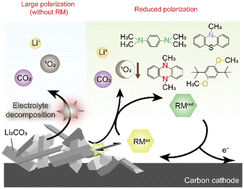Discovery of organic catalysts boosting lithium carbonate decomposition toward ambient air operational lithium–air batteries†
Abstract
The practical application of lithium–air batteries (LABs), which operate through electrochemical formation and decomposition of lithium peroxide (Li2O2), is limited by pure oxygen feeding. When using ambient air instead of pure oxygen, the detrimental lithium carbonate (Li2CO3) formation on the cathode surface accelerates, limiting the stable operation of LABs. Although redox molecules have been widely studied as a homogeneous catalyst to facilitate Li2O2 oxidation in LABs, their ability to decompose Li2CO3 has barely been explored. Here, we examined the catalytic effect of a series of organic redox mediators on removing Li2CO3. Systematic investigation confirms that the molecules with a redox potential higher than 3.7 V vs. Li/Li+ significantly lower the potential of Li2CO3 oxidation, for which the reaction mechanism was further supported by in situ gas analysis. This study suggests new possibilities of exploiting redox molecules to ensure efficient oxidation of both Li2O2 and Li2CO3 in LABs in ambient air.



 Please wait while we load your content...
Please wait while we load your content...